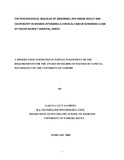| dc.description.abstract | Background The researcher in this study was involved in a cervical cancer screening project at Tigoni Distict Hospital. During ongoing screening, it was noted that women did not follow up their abnormal results despite much effort by staff at the hospital to do follow ups. From this, the researcher decided to find out why women were not following up on the abnormal results and further treatment. Such a study has not been done elsewhere in Kenya and more so in this geographical area. Objective The main objective of this research was to determine psychological sequelae of abnormal Pap smear and subsequent colposcopy examination of women who were undergoing cervical cancer screening. The researcher included the description of social-demographic profile, characteristics of women with abnormal Pap smear and subsequent colposcopy examination. Study Design This was a cross-sectional descriptive study. Setting The setting of this study was at Tigoni District Hospital Methodology The researcher used systematic random sampling selection of 143 respondents aged 18 years and above. These were women who had received abnormal Pap smear results and were undergoing subsequent colposcopy examination and consented to participate in the study. The questionnaires developed by the researcher were administered in a private room where respondents were identified by serial number (01-143) for confidentiality. Results
The social demographic variables for women who received abnormal Pap smear results and subsequent colposcopy examination showed the following: a mean age of 38.43; regarding religion, 69 (48.3%) were Catholic, 42 (29.4%) were Protestants while 74 (51.7%) comprised other religions. In education, 69 (48.3%) had below primary school level of education, 60 (42%) had some high school education while 14 (9.7%) passed secondary school education. According to the study, 112 (78.3%) desired to talk about colposcopy with service providers. A large
xii
number i.e. 106 (74.1%) had no previous Pap smear test done. The tests were for 118 (82.5%) who followed up colposcopy examination after the first visit. 98 (68.5%) were between the ages of 25-45 years and 21 (20. %) were above age 46. On the number of births, 102 (71.2%) had less than three births with 38 (27%) had over 7 births. Conclusion This was the first study of its kind among women who had received abnormal Pap smear results and were to undergo subsequent colposcopy examination in Kenya and in this geographical region. The study established high levels of psychological distress in the three domains of cervical dysplasia distress. It was found that women had little knowledge and understanding on Pap smear and subsequent colposcopy examination. The level of psychological distress (65%) was similar to that found in similar studies in the literature review. The researcher recommends strong involvement of psychosocial intervention in management of women undergoing Pap smear tests and colposcopic examination in future. The service providers involved in Pap smear screening and colposcopic procedures need to be aware of the accompanying distress. They should institute appropriate pre - screening counseling to allay the distress that may follow. Women who receive abnormal Pap smear results need a follow up by professional counselors /psychologists until they are able to cope with the results. Much time is needed to educate women about the abnormal smear result and colposcopic procedure. | en_US |

